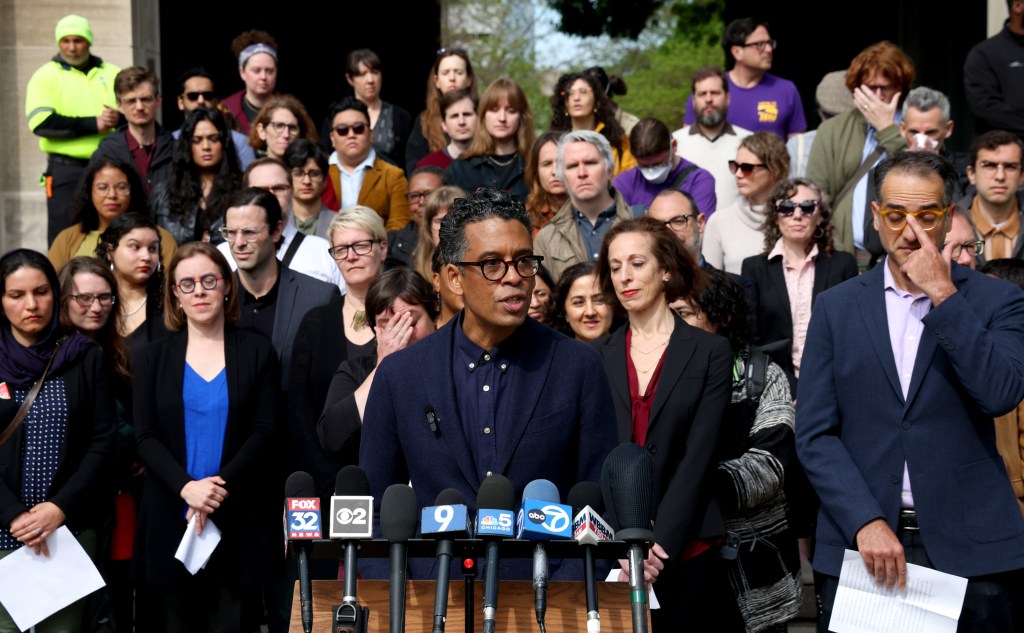A group of University of Chicago faculty gathered Monday morning on campus to express their support for the pro-Palestine encampment on the school’s Main Quadrangle a day after the university announced it had suspended negotiations with the protesters.
Dozens of faculty members affiliated with the “Faculty for Justice in Palestine” gathered on the steps of the university’s Edward H. Levi Hall to call on the university to re-open negotiations with student protestors and to refrain from engaging police.
“There are no updates yet on returning to negotiations,” said Callie Maidhof, a professor and associate director in the University’s Global Studies department. “We really hope they will start back up, but I have not heard anything back from (administrators).”
Students have occupied the quad since last Monday, chanting, waving flags and hosting religious events in solidarity with Palestine. Organizers have expressed they will not leave the quad until the university agrees to a list of demands, including divestment from all Israeli-affiliated companies.
Sunday evening, university administrators announced they had “suspended” negotiations with student protesters and cited “material inaccuracies and mischaracterizations” in social media.
“University leadership including academic deans worked with student designees of the protesters and faculty to explore possible paths to an agreement within the University’s principles,” the statement said. “Unfortunately, the requests of the protesters were inconsistent with the University’s principles and discussions were suspended.”
On Friday night, the university announced it was prepared to “intervene” to remove the pro-Palestine encampment with President Paul Alivisatos claiming student protesters have created a “systemic disruption” on campus.
The announcement led to tension on campus over the weekend with protesters expecting to be arrested. But as of Monday morning, the campus remained calm.
Elham Mireshghi, an assistant professor in the university’s divinity school, said faculty members wanted to reaffirm their support for students protesting the war in Gaza after negotiations paused.
She said the encampment is in line with educators’ academic priorities at the school.The university is famous for its “Chicago Principles,” a set of guidelines intended to ensure to “free, robust and uninhibited debate.”
“This was and is an educational and political endeavor, protected by the First Amendment,” Mireshghi said. “It should be especially safeguarded at UChicago, an institution dedicated to the free and open exchange of ideas. As faculty members, we will protect the safety of our students if the administration attempts to violently remove them, even if that means arrest and detention.”
Eman Abdelhadi, an assistant professor, said she is the only Palestinian faculty member at the University of Chicago. She said she has been involved with negotiations between student protesters and the administration and called upon administrators to allow protests to continue.
Abdelhadi emphasized that it is her responsibility to emphasize free speech as an educator. She also said faculty are prepared to face legal action alongside students.
“We are no more in fear for our jobs than people are of losing their tents in Gaza. Tents that replaced their homes that replaced their other homes,” Abdelhadi said. “Our fear pales in comparison.”
She added she feels there is a “free-speech double standard” at the university when it comes to Palestine. In November, University of Chicago Police Department officers arrested nonviolent protestors who engaged in a sit-in at the university’s admissions office.
Individuals were charged with a Class B misdemeanor for tresspassing, a charge dropped by state prosecutors in December. Abdelhadi said punishment of non-violent protest is not in line with the university’s free-speech principles.
She added that the school’s leadership has not checked on her safety or well-being as a Palestinian faculty member.
“The university hides behind the idea of political neutrality, but the university was not politically neutral when it came to Ukraine,” she said. “It created all this infrastructure for the people that were affected by the Ukrainian conflict. … That’s just one example of instances in which the university has been open to free speech so long as it is not about Palestine.”

Anton Ford, an associate professor in the philosophy department, said the group of faculty members stands with organizers’ calls upon the university to disclose its investments and divest from Israeli-affiliated companies.
“We reject as untrue the university’s claim that a peaceful encampment of students is an intolerable intolerable disruption of campus life,” Ford said. “What little disruption there has been is a trivial inconvenience, which is insignificant by comparison to the good of permitting our students to peacefully express their sincere political commitment.”
The encampments are among dozens across Chicago and the country that have roiled college campuses and led to police clashes and arrests. On Monday, Columbia University announced it had canceled its large university-wide commencement ceremony amid the ongoing pro-Palestinian protests but would hold smaller school-based ceremonies this week and next.
The weekend brought flaring tensions at other encampment protests in Chicago: Police arrested dozens who were occupying a garden at the School of the Art Institute Sunday. Later that day, pro-Palestinian agitators and pro-Israeli counterprotesters clashed at DePaul University’s Lincoln Park campus.
The encampments started in the past few weeks amid the mounting death toll in Gaza. More than 34,000 Palestinians have been killed, according to the Hamas-run Health Ministry.
Israel launched its war in Gaza after Hamas’ Oct. 7 attack on southern Israel, in which the group killed some 1,200 people and took 250 hostages. President Joe Biden on Thursday defended the right to protest but insisted that “order must prevail” at college campuses, as some in Chicago’s Jewish community demanded action at local universities to prevent hate speech.
Chicago Tribune’s Caroline Kubzansky contributed.


